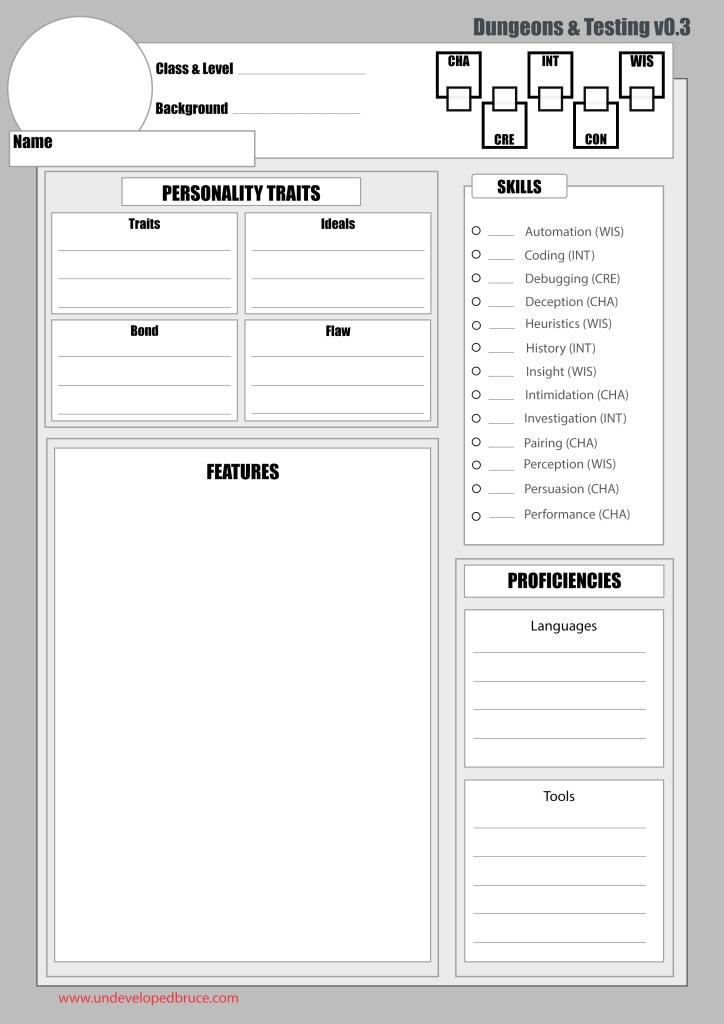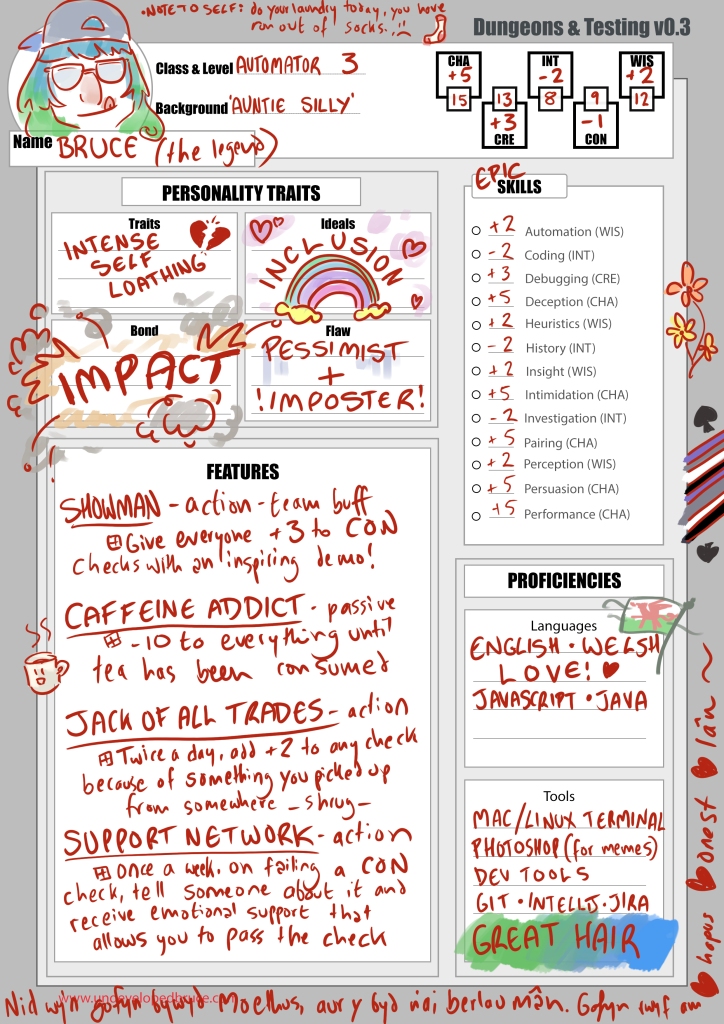Pushing the door open, you see a large window-lit room with monitors on each of the desks laid out in an almost random pattern. At most of them sit hunched figures typing away, and at first no one notices your entrance. Then a woman sat in a tall-backed desk chair by the window looks up and smiles. “Hi.” she says. “You must be the new tester, come in…”
This page and its contents are a work in progress, please feel free to tweet suggestions: @bruceonlybruce.
I love Dungeons and Dragons, roleplaying and fighting with implausible yet unforgettable characters in an awesome high-fantasy setting – so when I was thinking about ways I could measure my skills and progress as a tester, a character sheet was one of the first things that came to mind. For those who don’t know, a character sheet is the paper representation of your character, including details about their skills, background and equipment. You can find some examples here.
At the start of their journey, a character has no special abilities other than a thirst for adventure, but by completing quests with friends they can gain the experience they need to improve their stats and kit. The best part about it in my opinion is that no matter how far you go in the game, you’re never expected to be good at everything. In fact, it’s impossible – which is why you have to play in teams who have different specialisms. It takes all sorts to build a party of heroes, and the same goes for the testing community.
This page holds the latest example of the Dungeons and Testing character sheet, along with an explanation on how to fill it in if you’d like.
I did design some encounters a while ago, and we should have had the opportunity to play the game at TestBash Brighton, but 2020 happened. One day!
This was born of a wish to find clarity on what skills I have as a tester, where I fit into the team, and how I want to progress in the game of Testing (along with a desire to have fun, of course!) I hope you find it useful as well.
The Sheet

There is currently no form-fillable version, since I haven’t had the time to work out how to make one. So if you’d like to follow along, I’m afraid you will need to print it out, use digital drawing software or make your own. Sorry!
Below, I’ve laid out the sections from the sheet with some examples of how they could be filled out, and there’s an example at the bottom of one I drew all over.
Filling out the Character Sheet
General information
There’s no wrong way of filling out this information, since the sheet is for you, but in general I’d recommend it like this:
Name: Your name
Class: Your job title or specialism if you have one
Background: An extra history or identity that you feel affects your testing, eg ‘Customer Service’, ‘Eduction’, ‘Forager’ or ‘Hella Gay’.
Level: Number of years in tech.
Personality Traits
These are characteristics of your personality that can be a boon or a detriment to your work. Acknowledging them helps us better understand ourselves and each other, and manage expectations. And in a game of Dungeons and Testing, they affect the way we roleplay! I’ve added some examples for each type of trait, but please feel free to make up your own. I’d recommend 1 of each, and a maximum of 2.
Traits – general personality traits, for example:
- Nit-picky. I get annoyed at small issues.
- Meticulous. I am very careful and precise.
- Empathetic. I find it easy to understand the feelings of others.
Ideals – what you strive for and admire, for example:
- Accessibility is a fundamental part of software development, not an add-on.
- We should never treat our customers or their data as a commodity to be sold.
- Communication is the most effective tool we have for delivering products.
Bond – a promise or a mission that binds you, for example:
- Ambition. I will be the very best like no one ever was! (to catch them is my real test, to train them is my cause!)
- Mentorship. I will pull up the people around me at every opportunity.
- Impact. I will leave a big, positive impression on everyone I meet.
Flaw – your great weakness, for example:
- Pessimist. I think the worst and am easily disheartened.
- Imposter Syndrome. It’s only a matter of time before everyone notices.
- Burnt Out. I’m not sure I can carry on for much longer like this.
Ability Scores
These are numbers that represent how charismatic, intelligent, wise and creative you are, and how strong your constitution is. 10-11 is an average person, 15 is high and 8 is for the stats you maybe don’t think you’re so great at. Their meanings are explained here:
- Charisma (CHA) – how outgoing, charming and handsome you are; networking skills
- Intelligence (INT) – book smarts; the ability to study and find information; solve sudokus
- Wisdom (WIS) – common sense and intuition; understanding people and their motives
- Creativity (CRE) – not just creative ability in terms of art, but also problem solving
- Constitution (CON) – survivability and resilience; how much rubbish you can cope with
Since you’re unlikely to actually need to play this game, you can simply score these in order of strength, assigning a standard array of values to them in that order.
The standard set is: 15, 13, 11, 10, 8.
So for me, with an order of Charisma > Creativity > Wisdom > Constitution > Intelligence, I would get:
CHA 15 – INT 8 – WIS 11 – CRE 13 – CON 10
If you don’t like that array, then you may move up to 3 points around, but your starting values must be between 8 and 15. In this case, I would like to buff my wisdom stat at the expense of constitution, giving me an end result of:
CHA 15 – INT 8 – WIS 12 – CRE 13 – CON 9
Skills
As testers, we come across different types of encounters in our daily lives, and we all have unique skillsets we use to solve them. Some of these types of skills are listed in the Skills section.
Perhaps there’s a problem between two of your colleagues. Someone with a high Intelligence stat might make a history check to see if they know what happened to cause it. Someone with high Wisdom might instead use an insight check to find out what’s really going on below the surface. A tester with high Charisma could either use persuasion or deception to resolve the situation.
Other problems could be security or accessibility issues, slow deployments, running a workshop or communicating a strange new bug.
Each of the skills listed on the sheet have one of the abilities (Charisma, Wisdom etc) attached to it. The higher your ability score is, the higher your bonus will be for using the associated skills, and thus the higher your chance of success!
These skills and their associated abilities are:
- Automation – Wisdom
- Coding – Intelligence
- Debugging – Creativity
- Deception – Charisma
- Heuristics – Wisdom
- History – Intelligence
- Insight – Wisdom
- Intimidation – Charisma
- Investigation – Intelligence
- Pairing – Charisma
- Perception – Wisdom
- Performance – Charisma
- Persuasion – Charisma
If you’re filling in the numbers, then you can write your ability score modifier next to each of these. This modifier is every point above or below 10 that you have in that ability.
For example, I have a Charisma stat of 15, so I would write ‘+5’ next to deception, intimidation, pairing, performance and persuasion. I also have an Intelligence stat of 8, so I would write ‘-2’ next to coding, history and investigation.
Proficiencies
So that’s all pretty general stuff, but maybe you have a secret weapon that will give you a bonus in an encounter. You might not have the highest Intelligence stat around, but you’ve been writing Java for years just fine, thank you very much! You’ve probably found some tools to help you shore up the stats you’re not amazing at naturally. That’s what this section is for, and it’s a bit of a free-for-all. Whatever you feel is important, you can put here!
It’s split into two sections – languages and tools – but you can interpret them however you like.
Languages:
- English
- Welsh
- The Love Languages
- JavaScript
- Java
- Bit of Spanish
- Greetings in Russian
Tools:
- Selenium
- JIRA
- XRAY
- Browser developer tools
- IDEs
- Mac Terminal
- WireShark
- Photoshop
With a poor Intelligence stat, I’d have poor chances of being able to understand a code snippet using the Coding skill during an encounter. However, if that code snippet is in a language I am proficient in… Let’s go, I am arbitrarily declaring that I have a +10 bonus to this skill check, an none of you can stop me!
Features
This section lists special features, resistances or actions you want to add, based on your background or specialism. It’s an opportunity to be more than your numbers, more than your ability scores or proficiencies. This is where this bit of paper becomes you, and as such it is entirely up to you what’s in it.
Here are some examples off the top of my head:
Showman (action): once per week, you can draw on your past experience as a children’s entertainer to give an exciting feature demo or workshop that inspires your team, giving everyone +3 to constitution checks for the rest of the day.
Accessibility Guru (passive): +10 to any check relating to accessibility, regardless of skill or ability being used. With +5 to passive perception of potential accessibility issues, you are more likely to spot when something is wrong without needing to make a specific check.
Cheerleader (action): you are well known for using your energy on helping others more than yourself. Twice per day, you may help another player with an encounter by adding your skill modifier for a specific check to theirs.
Hangry (passive): if you have not eaten in the last 4 hours, apply -5 to all skill checks until you eat.
Example

Updates 30/12/2020 for v0.3:
- removed proficiency bonus, tools and heuristics, and equipment sections in favour of a more flexible Features section covering all bases
- removed health and influence section until I work out what to do with them
- removed Security and Performance testing from the skill check list, as they are too specific and should instead be added as Features at the player’s discretion
- basically Features are everything now, because DnD character sheets are actually pretty complicated and I don’t want to write a 300-page rulebook

